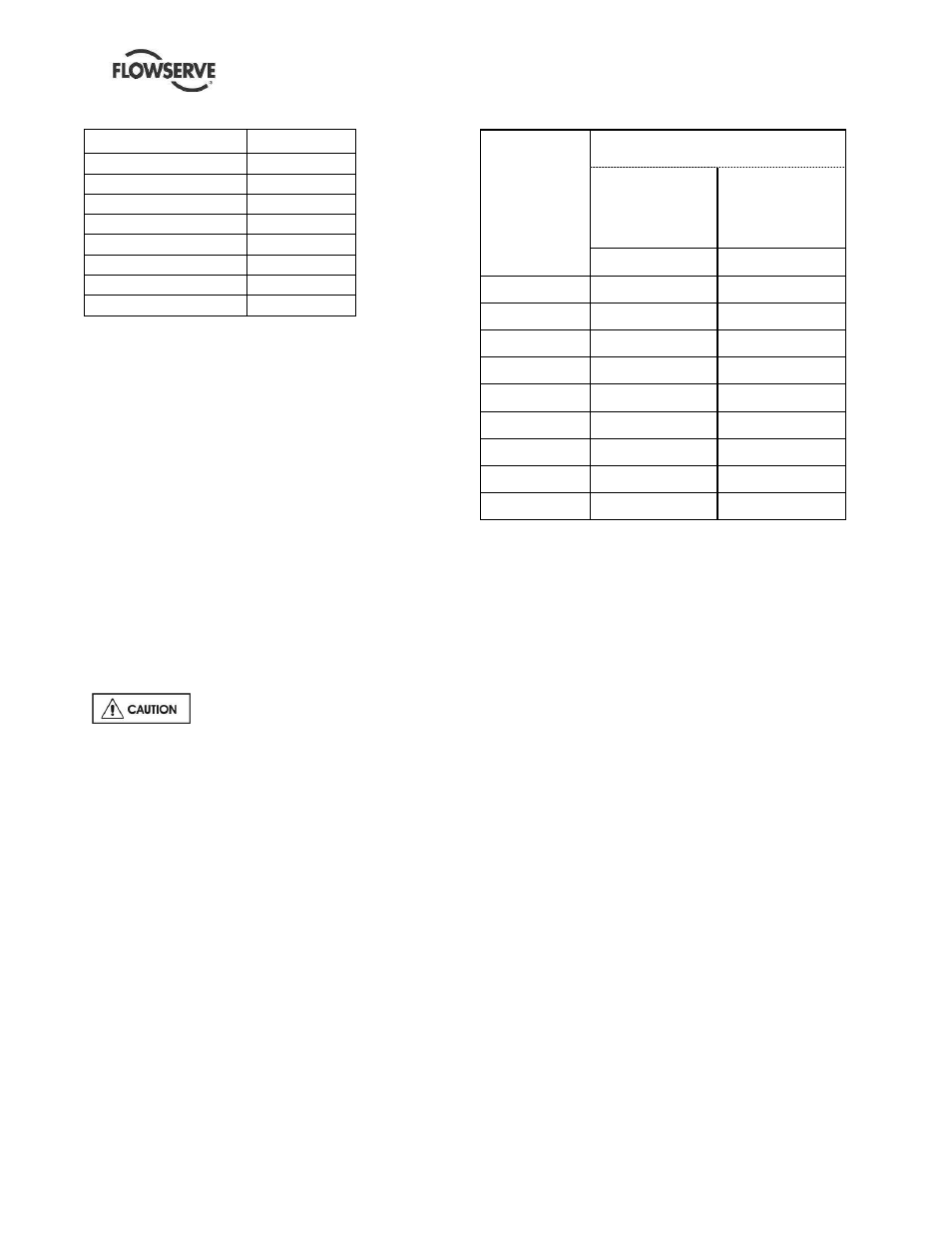Flowserve Polybase baseplates User Manual
Page 19

Polybase Baseplate INSTRUCTIONS ENGLISH 71569284 – 12-10
Page 19 of 24
flowserve.com
Table 6-2 Insert testing unlubricated torque limits
Test boltsize
Nm (lbf•ft)
M6
16 (12)
M8 and 5/16 in.
22 (16)
M10 and 3/8 in.
45 (33)
M12 and ½ in.
105 (77)
M16 and 5/8 in.
150 (111)
M20 and ¾ in.
220 (162)
7/8 in.
275 (203)
M24 and 1 in.
410 (302)
All torques in table are for dry threads.
Note:
1.) For lubricated threads, use 75% of the values.
2.) Excessive torque can damage the Polybase
baseplate by pulling out the inserts.
3) These are maximum values valid for testing the
inserts, Fastener torquefor mounting the
equipmentis given clause 6.7.
4) As a default, the bolts used for insert testing
should be scrapped. They must not be reused if
the torque during test has attained 90% or more
of the proof test value of the bolt material or 80%
of its yield strength, whichever is the lowe
r.
6.7 Recommended fastener mounting
torques
Tighten pump and motor hold down fasteners using a
torque wrench. Apply table 6-3 recommended
torques.
DO NOT EXCEED THE HIGHEST
TORQUE VALUE.
Any fastener material used for mounting the
equipment to the Polybase must have a minimum
yield strength of 210 MPa (30 KSI) at room
temperature.
Table 6-3 Equipment fasteners mounting torques
Fastener Mechanical Property
X
Strength
(1)
Y
Strength
(2)
Max Torque
(dry)
Max Torque
(dry)
Fastener Size
Nm (
lbf•ft)
Nm (
lbf•ft)
M6
8 (6)
12 (9)
5/16 in.
8 (6)
17 (13)
M8
11 (8)
17 (13)
M10 and 3/8 in.
15 (11)
35 (25)
M12 and ½ in.
35 (26)
80 (60)
M16 and 5/8 in.
75 (55)
115 (85)
M20 and ¾ in.
130 (95)
165 (125)
7/8 in.
185 (135)
205 (150)
M24 and 1 in.
280 (205)
310 (230)
Above torque values are for unlubricated threads. For
lubricated threads use 75% of tabulated torques.
(1) X STRENGTH fasteners materials have yield strengths
within 210 - 440 MPa (30 – 64 KSI) at room temperature.
They need to be tightened within +/-5% of the value given
in table above. THESE FASTENERS MUST NOT BE
TIGHTENED MORE THAN 105% OF THE X STRENGTH
FASTENER TORQUE VALUES PER TABLE 6-3.
Commonly used X strength hold down fasteners are:
•
UNC fasteners in carbon steel per ASTM A307 Grades
A&B (SAE J429 Gr.1&2) and the common AISI 300
stainless steel series;
•
Metric fasteners in carbon steel per ISO 898-1 Classes
4.6 and those in stainless steel per
ISO 3506 Gr. A1, A2 and A4, all in Class 50.
(2) Y STRENGTH fasteners materials have a minimum
yield strength of 450 MPa (65 KSI) at room temperature.
These Y strength fasteners need to be torqued to values
not lower than those for of the X strength fasteners, but
Y STRENGTH FASTENERS MUST NOT BE TIGHTENED
MORE THAN THE VALUES LISTED IN TABLE 6-3. The
Polybase baseplate material properties and the thread
inserts bonding are the limiting factors imposing the
tabulated ceiling values for torques.
Usual Y strength hold down fasteners include:
•
UNC fasteners in carbon steel per SAE J429 Grades 4
and above, and per ASTM A193 Grade B7;
•
Metric fasteners in carbon steel per ISO 898-1 Classes
8.8 and above, and in stainless steel per
ISO 3506 Gr. A1, A2 and A4, Classes 70 & 80.